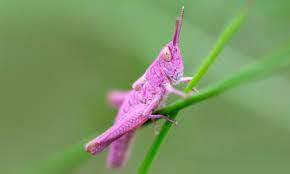Nature has a way of surprising us with its remarkable and rare phenomena, captivating our attention and filling us with wonder. Recently, a rare pink grasshopper was spotted in a garden in the UK, enchanting both nature enthusiasts and scientists alike. This extraordinary and unique sighting has sparked curiosity and excitement, shedding light on the fascinating world of insects and the wonders of biodiversity. In this article, we delve into the discovery of the rare pink grasshopper, exploring its characteristics, significance, and the importance of preserving our natural habitats.
The Rarity of Pink Grasshoppers
Pink grasshoppers, scientifically known as “anomalous grasshoppers,” are a rare genetic variation of the common green grasshopper. These remarkable creatures possess a striking pink or rose-colored hue due to a condition known as erythrism, which results in an excess of red pigmentation. This genetic anomaly occurs in approximately one in every 500,000 grasshoppers, making it a truly unique and uncommon sight.
A Delicate Beauty
The pink grasshopper’s delicate beauty captures the imagination of those fortunate enough to encounter it. Its vibrant pink coloration stands out prominently against the backdrop of lush greenery, making it a captivating sight. With their graceful movements and slender bodies, these grasshoppers display an ethereal charm that is as enchanting as it is rare.
Also read: “Garden Bliss: 7 Year-Round Tips for Thriving Plants”
Scientific Significance
The discovery of a pink grasshopper is not only a visual delight but also holds scientific significance. These rare individuals provide researchers and scientists with an opportunity to study genetic variations and their effects on the insect population. By understanding the mechanisms behind such genetic anomalies, scientists can gain insights into the broader concepts of biodiversity and adaptation.
Preserving Biodiversity and Natural Habitats
The presence of a rare pink grasshopper serves as a reminder of the importance of preserving biodiversity and protecting natural habitats. Ecosystems thrive when they encompass a wide range of species, each playing a vital role in maintaining balance and ecological harmony. It is crucial to conserve and protect these habitats to ensure the continued existence of unique and rare species like the pink grasshopper.
Appreciating Nature’s Wonders
Encounters with rare and extraordinary creatures like the pink grasshopper remind us of the immense beauty and diversity that exists in the natural world. They inspire us to appreciate the small wonders around us, fostering a deeper connection with nature and igniting a desire to explore and understand our surroundings.
Citizen Science and Nature Observation
The sighting of a pink grasshopper in a UK garden highlights the value of citizen science and nature observation. Everyday individuals who take an interest in the natural world can contribute to scientific knowledge by reporting and documenting unusual sightings. Citizen science initiatives play a crucial role in monitoring biodiversity and providing valuable data for conservation efforts.
Educational Opportunities
Rare sightings like the pink grasshopper offer excellent educational opportunities, particularly for young learners. Exploring the biology, genetics, and ecological context of these creatures can spark curiosity and foster a deeper appreciation for the intricacies of the natural world. Encouraging children to observe and engage with nature promotes environmental awareness and encourages future conservation efforts.
Conclusion
The appearance of a rare pink grasshopper in a UK garden reminds us of the wonders that can be found within our natural surroundings. This extraordinary sighting sparks awe and curiosity, igniting a desire to delve deeper into the world of insects, genetics, and biodiversity. It serves as a reminder to protect and preserve our natural habitats, fostering appreciation for the delicate balance of ecosystems. Let us celebrate the rare and unique, nurturing a sense of wonder for the marvels of the natural world.
